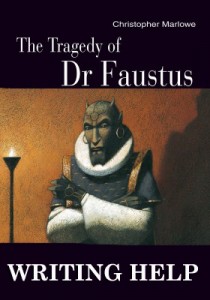
Essay Paper on Dr. Faustus
In the history of the play’s criticism, the problem of its genre produced the most controversy. I submit here that this critical conflict is based on confusion: the discourse meaning (textual) and the interpretative meaning (contextual) have been mistakenly separated. I regard the monologic understanding of genre, as a ready-made form containing the content, to be restrictive and prefer to use Bakhtinian definition of genre as ‘a form shaping ideology.’ The problem of identifying the genre of the play thus ceases to be an either/or choice between morality and tragedy, allowing an interpretative space for more holistic readings. Realizing that the generic dichotomy does not have to be resolved negatively, gives room to a fuller understanding of the work.
 According to Mikhail Bakhtin, genre is a cultural position from which perspective one views the world not merely a set of conventions. In a way genre is no more nor less than a specifically patterned form of consciousness. Since Bakhtin sees thinking itself as a dialogic process, genres too engage in a dialogue of heteroglot voices be it within one text or the whole of cultural context. Genres embody, or as Bakhtin puts it, “congeal” different visions of cultural context and personal responses to it. An individual self is understood to be developing in a predetermined pattern (a way of salvation) and finally fixed permanently (either in salvation or damnation).
According to Mikhail Bakhtin, genre is a cultural position from which perspective one views the world not merely a set of conventions. In a way genre is no more nor less than a specifically patterned form of consciousness. Since Bakhtin sees thinking itself as a dialogic process, genres too engage in a dialogue of heteroglot voices be it within one text or the whole of cultural context. Genres embody, or as Bakhtin puts it, “congeal” different visions of cultural context and personal responses to it. An individual self is understood to be developing in a predetermined pattern (a way of salvation) and finally fixed permanently (either in salvation or damnation).
In the classical tragedy, on the other hand, the context is communal and selfhood is essential, defined and determined at all points on its journey of self-discovery – in the climactic moment, an individual realizes the true (unfree) nature of the self. Significantly, in Doctor Faustus, Marlowe allows for a dynamic interaction of these two visions, and, as is the result of any genuine dialogue, creates true newness that neither of the parts possesses separately. For many critics, the choice of reading Dr.Faustus as a morality used to immediately presuppose a Christian interpretation of it, while choosing to view the play as a tragedy, would just as certainly classify it as atheistic, or at least heterodox.
Thus in the essay “The Possibility of a Christian Tragedy,” Laurence Michel asserts that the extent to which the play is tragic is the extent to which it is not Christian, because Christianity is best represented dramatically as a comedy of redemption. I would argue with this statement and assert that Faustus is a Christian tragedy of damnation. Conflicting two genres, Marlowe presents his unique attempt at patterning the experience, which is not so much irreverent as re-visional.
The play’s interpreters have not been very appreciative of this asset of Doctor Faustus until very recently, viewing it rather as the work’s most problematic aspect. In contemporary literary criticism, there exist two approaches that support the drama’s more holistic reading, one is the Kierkegaardian philosophy of despair (see also Nel’s work), and the other is Bakhtinian theory of dialogue. In this essay, I will employ the findings of both philosophers. The difficulty of the choice between morality and tragedy readings of Doctor Faustus is often reformulated as a problem of Faustus’s fate and damnation.
Disclaimer: This is just a free sample of the research paper, or part of the research paper on the given topic you have found at ProfEssays.com. If you feel you need professional writing assistance contact us! We will help you to create perfect research paper on any topic. ProfEssays.com – Leading custom essay and dissertation writing company and we are 24/7 open to serve you writing needs!
Don‘t hesitate! ORDER NOW!
 + 1-888-827-0150
+ 1-888-827-0150 + 44-20-3006-2750
+ 44-20-3006-2750










